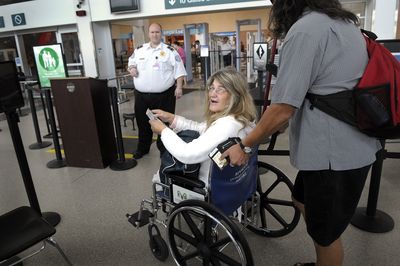Lifting up low-income concerns
Delegates gather to advocate for policies to help families

The Republicans and Democrats have had their say. Now it’s Agnes Broncheau’s turn.
The way she sees it, the struggle between the political parties was a distraction. The business at hand, says the Nez Perce woman who lives in Spokane’s East Central neighborhood, is mending families.
“American society is out of balance,” she says. “Our families need healing.”
Today, Broncheau will be part of a group of 80 Spokane families who will join a delegation of 800 Washington residents at a convention of low-income working people at the Los Angeles Convention Center.
Broncheau will join 15,000 low-income people in simultaneous conventions in Los Angeles, Chicago and Birmingham, Ala., in adopting a national platform that addresses the challenges faced by families.
The Equal Voices for America’s Families campaign is organized by the Marguerite Casey Foundation, a nonprofit low-income advocacy group based in Seattle. The foundation is contributing $6 million to the effort and Casey Family Programs in Seattle is pitching in $1 million, said Kathleen Baca, the foundation’s communications director.
The conventions follow 65 town hall meetings in 12 states, where 12,000 low-income working people brought their issues to the table. Baca said those issues were synthesized into the platform that will be presented today.
“We hope what comes of it is families have a stronger role in determining their future,” Baca said.
The plans that form the Equal Voices platform include a call for child care subsidies and early childhood education, criminal justice and immigration reform, living wages, affordable housing and universal health care.
Broncheau said she is among the nearly 46 million people without health insurance. She makes too much as an in-home care provider to qualify for Medicaid, yet she cannot afford her prescriptions and still owes Deaconess Medical Center for emergency care she received after a car crash in 2006.
The barriers to an American Indian woman, Broncheau said, include, “the wreckage of our past and our own behaviors, domestic violence, alcohol, generational trauma, drugs, discrimination, poverty, abandonment at birth, rape, loss of loved ones and grief.”
Today she will call on the presidential candidates of both major political parties to address these barriers through health care, education and criminal justice reform.
The Spokane delegation was organized by Voices, a low-income advocacy group, the Spokane Alliance, Odyssey Youth Center, Thin Air Radio and the Peace and Justice Action League.
“We asked the questions, ‘What type of America do you want to live in? What’s keeping you from getting there? What would you need to get there?’ ” said Cathy Mann, director of Voices.
The Equal Voices platform tries to answer those questions.
The poverty rate in Spokane County is 16.7 percent, Mann said, citing Spokane Regional Health District figures from 2005. In some Spokane city neighborhoods the rate is 38 percent. A third of the county’s children live in poverty.
Also attending the Los Angeles convention is Stacie Windsor, a disabled 45-year-old domestic violence survivor and mother of four children. She is currently raising two teenage boys on the $9.75 an hour she makes as an in-home care provider.
“That is not a living wage,” Windsor said. “Someone like John McCain would have no clue how to live on less than $2,000 a month.”
She said she works full-time and still qualifies for Medicaid and food stamps. A living wage is her top issue, but the platform she will support today calls for comprehensive changes, not issue by issue.
“There is a ceiling and you keep hitting your head on it,” Windsor said.
She knows many people who work three or more part-time jobs because employers don’t want to offer health care benefits. And under WorkFirst, the state’s welfare reform program, she said, lose your job and you lose child care. “Who’s watching your kids while you are looking for work? Windsor asked. “Hopefully, it’s not your angry boyfriend.”
Mann said the national model in which heads of households are working yet cannot afford to bring their families out of poverty is not sustainable, and neither is a state tax system that disproportionately burdens the poor.
She cited figures from the Washington Tax Fairness Coalition that show people in the lowest 20 percent income bracket pay 17.4 percent of their income in state and local taxes. The top 1 percent pays about 2.5 percent.
The people raising their voices in Los Angeles, Chicago and Birmingham today represent the poor, Mann said, but they are not powerless. “We have very little to fight back with, but we do have our vote,” she said.